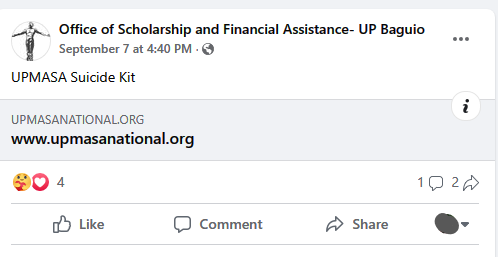A Facebook post of a University of the Philippines-Baguio office earned concerns for how it shared its prevention toolkit related to a mental health issue on social media.
Last September 7, the page of the university’s Office of Scholarship and Financial Assistance (OSFA) shared a PDF document from the UP Medical Alumni Society in America (UPMASA) titled “Suicide Prevention Toolkit.”
The post was captioned “UPMASA Suicide Kit.”

The document was arranged by the UPMASA Mental Health Taskforce.
The toolkit notes that it “does not constitute medical advice” and is “not meant or intended to diagnose, treat, cure or prevent any medical or psychiatric illness or condition, health problem or issue.”
However, UPMASA said it may be used “for informational purposes only.”
The suicide prevention toolkit includes warning signs, risk factors, prevention and ways how to get help.
Meanwhile, OSFA’s caption for the document worried some Filipinos on Facebook and Twitter.
“*Suicide Prevention Kit,” a Facebook user said, correcting the caption.
“Bakit naman suicide kit ahbxysb dapat ‘suicide prevention kit’ ‘di ba? HUHUHU,” a Twitter user wrote.
“UP anuna,” another online user said with a loudly crying face emoji.
“Nani????” wrote a different Pinoy who was also shocked by the caption. “Nani” is a Japanese term for “what.”
Last year, the Philippine Statistics Authority reported a 57% increase in the country’s suicide rate in 2020 compared to the preceding year.
The PSA said that it is the 25th leading cause of death in 2020, up by six notches from its 31st place in 2019.
The Department of Health recently shared tips on how people can offer help — reaching out, encouraging understanding and sharing experiences.
It also shared the hotlines of entities that an individual can call if they needed to talk to someone, or know someone who needs help.
The DOH also shared a list of the hotlines of its Psychosocial Helpline Directory through Google Drive.
For those who may need mental support and assistance, they can reach the National Center for Mental Health through the following hotlines:
0917-899-8727 and 0966-351-4518 (Globe and TM subscribers), 0908-639-2672 (Smart and TNT subscribers) and 1553 or 1800-1888-1553 (toll-free landline).
Individuals may also contact Hopeline, Natasha Goulbourn Foundation’s crisis support service, through the following numbers:
0917-558-4673 or 2919 (Globe and TM subscribers), 0918-873-4673 (Smart), 02-8804-4673 (PLDT).










